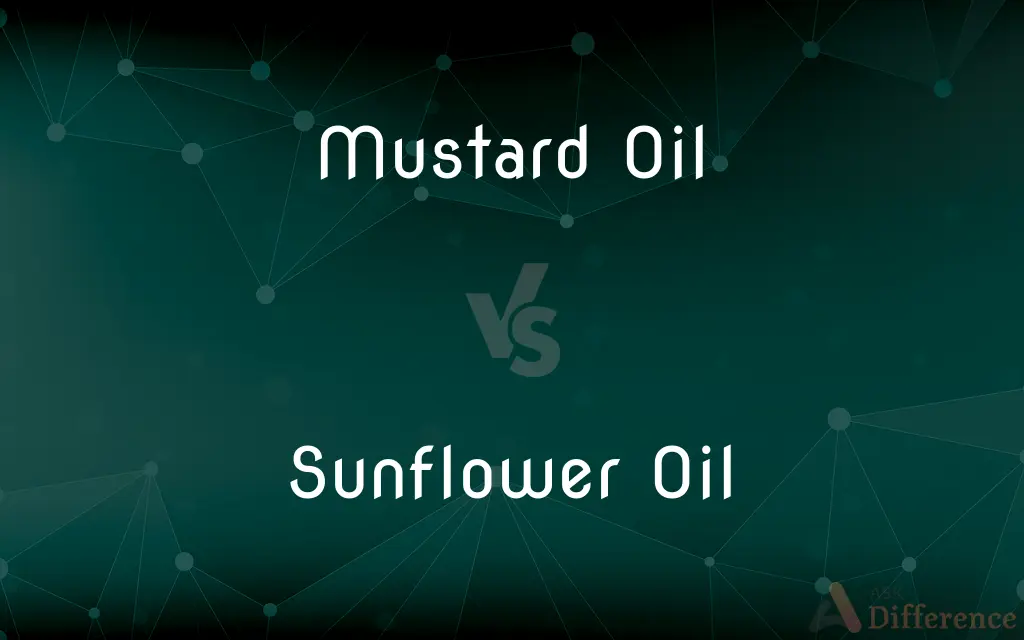Mustard Oil vs. Sunflower Oil — What's the Difference?
Edited by Tayyaba Rehman — By Fiza Rafique — Published on November 18, 2023
Mustard Oil is extracted from mustard seeds and has a pungent aroma and taste, while Sunflower Oil is derived from sunflower seeds and is light with a mild flavor.

Difference Between Mustard Oil and Sunflower Oil
Table of Contents
ADVERTISEMENT
Key Differences
Mustard Oil and Sunflower Oil are both commonly used oils in various cuisines, but they come from different sources and have distinct characteristics. Mustard Oil is extracted from the seeds of the mustard plant, which belongs to the Brassicaceae family. It's known for its strong, pungent aroma and flavor, making it a distinctive ingredient in many dishes, especially in Indian and Bengali cuisines. On the other hand, Sunflower Oil is procured from the seeds of the sunflower plant and is characterized by its light color and mild flavor, making it a versatile oil suitable for various culinary applications.
The nutritional profiles of Mustard Oil and Sunflower Oil also differ. Mustard Oil is rich in monounsaturated and polyunsaturated fats and is particularly high in omega-3 fatty acids. Its unique compounds, like glucosinolates and isothiocyanates, have been studied for their potential health benefits. Sunflower Oil, however, is primarily composed of polyunsaturated fats, specifically linoleic acid, and is often chosen for its heart-healthy attributes.
When considering cooking applications, the smoke points of these oils come into play. Mustard Oil has a medium smoke point, making it suitable for sautéing and frying at moderate temperatures. Sunflower Oil has a higher smoke point, making it more apt for high-temperature cooking methods like deep frying.
In terms of availability and usage, Mustard Oil is more prevalent in South Asian countries due to its strong association with regional dishes. It is sometimes applied topically for its purported therapeutic properties. Sunflower Oil enjoys wider global popularity and is commonly found in processed foods, baked goods, and salad dressings due to its neutral flavor.
Comparison Chart
Source
Extracted from mustard seeds
Derived from sunflower seeds
ADVERTISEMENT
Flavor
Strong, pungent aroma and taste
Light, mild flavor
Nutritional Profile
Rich in omega-3 fatty acids and other compounds
High in linoleic acid (polyunsaturated fat)
Smoke Point
Medium smoke point
Higher smoke point
Common Usage
Predominantly in South Asian cuisines
Widespread in various cuisines and processed foods
Compare with Definitions
Mustard Oil
An oil extracted from mustard seeds.
She used Mustard Oil for the traditional dish to enhance its flavor.
Sunflower Oil
An oil derived from the seeds of the sunflower plant.
She used Sunflower Oil for frying due to its high smoke point.
Mustard Oil
Commonly used in South Asian dishes.
Mustard Oil is a staple in many Bengali recipes.
Sunflower Oil
Common in processed foods and salad dressings.
She checked the label to find Sunflower Oil as an ingredient.
Mustard Oil
Sometimes applied topically for its therapeutic properties.
He massaged Mustard Oil into his joints for relief.
Sunflower Oil
High in linoleic acid, a type of polyunsaturated fat.
For a heart-healthy option, she chooses Sunflower Oil.
Mustard Oil
Rich in omega-3 fatty acids and other beneficial compounds.
For its nutritional benefits, he incorporates Mustard Oil into his diet.
Sunflower Oil
Characterized by its light color and mild flavor.
Sunflower Oil's neutral taste makes it versatile in cooking.
Mustard Oil
Known for its strong, pungent aroma and taste.
The distinct aroma of Mustard Oil filled the kitchen as she heated it.
Sunflower Oil
Suitable for high-temperature cooking methods.
When deep frying, Sunflower Oil is often her preferred choice.
Common Curiosities
Is Sunflower Oil heart-healthy?
Sunflower Oil is high in linoleic acid, a polyunsaturated fat, which is considered heart-healthy.
Which oil has a stronger flavor, Mustard Oil or Sunflower Oil?
Mustard Oil has a stronger, pungent flavor, while Sunflower Oil is milder.
Which oil is traditionally used in South Asian dishes?
Mustard Oil is commonly used in South Asian cuisines.
Which oil is more globally popular?
Sunflower Oil enjoys wider global popularity due to its versatility.
Can I use Sunflower Oil for deep frying?
Yes, Sunflower Oil has a high smoke point, making it suitable for deep frying.
Can I use Mustard Oil for massage?
Some people use Mustard Oil topically for massages due to its purported therapeutic properties.
Is Mustard Oil rich in omega-3 fatty acids?
Yes, Mustard Oil is notably rich in omega-3 fatty acids.
Can I use Mustard Oil for sautéing?
Yes, Mustard Oil has a medium smoke point suitable for sautéing.
Is Sunflower Oil good for salad dressings?
Yes, due to its light flavor, Sunflower Oil is often chosen for salad dressings.
Which oil has a higher smoke point?
Sunflower Oil has a higher smoke point compared to Mustard Oil.
Which oil is lighter in color?
Sunflower Oil is lighter in color compared to Mustard Oil.
Which oil is derived from the mustard plant?
Mustard Oil is extracted from mustard seeds.
Is Mustard Oil good for the skin?
Some believe Mustard Oil has skin benefits, but it's essential to patch-test before widespread use.
Can I substitute Mustard Oil for Sunflower Oil in recipes?
While possible, the strong flavor of Mustard Oil can significantly alter the taste of the dish.
Is Sunflower Oil commonly found in processed foods?
Yes, Sunflower Oil is often used in processed foods due to its neutral flavor.
Share Your Discovery

Previous Comparison
Northern Lights vs. Southern Lights
Next Comparison
Summary vs. Executive SummaryAuthor Spotlight
Written by
Fiza RafiqueFiza Rafique is a skilled content writer at AskDifference.com, where she meticulously refines and enhances written pieces. Drawing from her vast editorial expertise, Fiza ensures clarity, accuracy, and precision in every article. Passionate about language, she continually seeks to elevate the quality of content for readers worldwide.
Edited by
Tayyaba RehmanTayyaba Rehman is a distinguished writer, currently serving as a primary contributor to askdifference.com. As a researcher in semantics and etymology, Tayyaba's passion for the complexity of languages and their distinctions has found a perfect home on the platform. Tayyaba delves into the intricacies of language, distinguishing between commonly confused words and phrases, thereby providing clarity for readers worldwide.












































